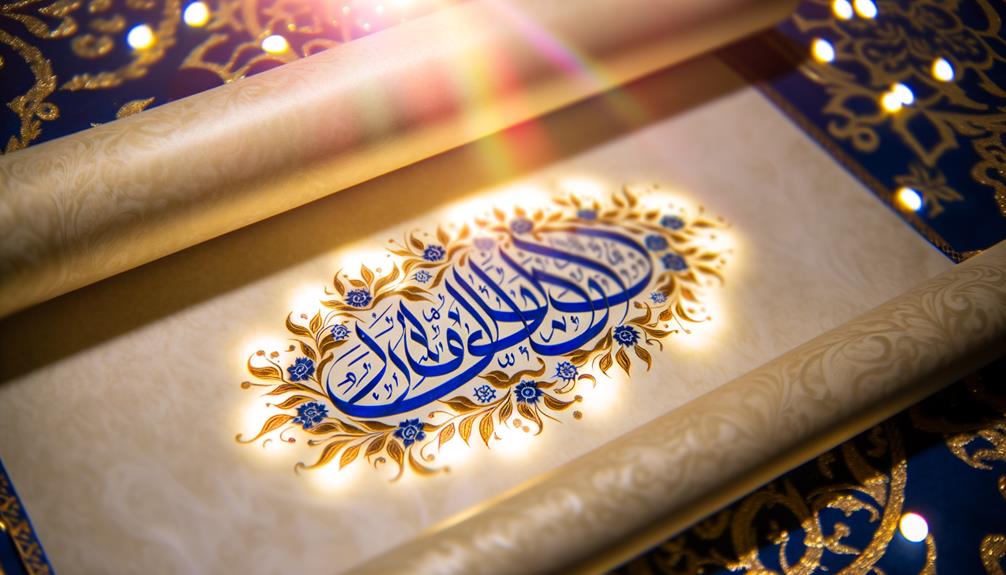Afzal Name Meaning in English
The name Afzal, derived from the Arabic term 'afḍal,' conveys notions of excellence, superiority, and moral distinctiveness. It originates from the Arabic root 'f-d-l' and holds a prestigious place in Islamic culture, often linked to spiritual leadership and intellectual prowess.
Historically, Afzal has been a respected name associated with influential figures and is prevalent in regions with strong Islamic heritage. Symbolizing wisdom and scholarly achievements, its popularity fluctuates due to globalization and cultural dynamics.
Namesakes such as Afzal Khan and Afzal Ahmed Syed illustrate its diverse cultural impact. Further exploration illuminates its deep historical and cultural roots.

Key Takeaways
- Afzal is an Arabic name meaning 'superior' or 'most excellent.'
- The name Afzal symbolizes wisdom, scholarly achievement, and perseverance.
- It is associated with moral integrity, intellectual acumen, and social regard.
- Afzal has historical significance in Islamic culture and literature.
- Prominent in regions with Islamic heritage, the name reflects leadership and excellence.
Etymology of Afzal
The etymology of the name Afzal traces its roots to the Arabic language, where it is derived from the word 'afḍal,' meaning 'superior' or 'more excellent.' This term is a form of the Arabic root 'f-d-l,' which conveys notions of virtue, prominence, and excellence.
The morphological structure of 'afḍal' is an elative form, often used in Arabic to denote the comparative and superlative degrees of adjectives. The name Afzal encapsulates a sense of preeminence and distinction, reflecting a linguistic tradition that values excellence and high standing.
This etymological foundation provides a rich, semantic context, enabling a deeper appreciation for the name's inherent connotations of superiority and excellence within its linguistic and cultural framework.
Cultural Significance
In various cultures, particularly within Islamic societies, the name Afzal holds profound significance, often associated with individuals who are esteemed for their moral virtues and intellectual achievements. This name is revered for several reasons:
- Moral Integrity: Individuals named Afzal are often seen as paragons of ethical behavior.
- Intellectual Acumen: The name suggests a high level of wisdom and scholarly aptitude.
- Social Respect: Those with the name are frequently held in high regard within their communities.
- Spiritual Leadership: The name is sometimes linked to spiritual guidance and religious leadership.
Such attributes reinforce the cultural importance of the name, making it a popular choice among parents who wish to imbue their children with these esteemed qualities.
Historical Context
The historical roots of the name 'Afzal' trace back to Arabic and Persian origins, where it signifies superiority or excellence.
This etymological foundation has imbued the name with cultural significance across various Muslim-majority societies.
Over time, the name's usage and connotations have evolved, reflecting broader socio-cultural and linguistic shifts within these communities.
Origins and Etymology
Afzal, a name deeply rooted in Arabic culture, carries significant historical and etymological weight, tracing its origins back to classical Arabic texts and Islamic traditions. The etymology of Afzal can be thoroughly understood through the following points: The name Afzal is derived from the Arabic root word “afzala,” which means ‘to excel’ or ‘to surpass.’ This reflects the value placed on excellence and superiority in Arabic culture. Additionally, in Islamic traditions, the name Afzal is associated with attributes such as virtue, honor, and distinction. The meaning of the name Affan, a variation of Afzal, also carries connotations of excellence and superiority. In addition, the meaning of the name Afzal extends beyond just its linguistic roots, as it holds a symbolic significance in Arabic societies, representing an individual of utmost value and worth. Furthermore, the name Afzal has been traditionally used to denote a sense of superiority and prestige within Arabic communities. Similarly, the meaning of the name Ozil, a variation of Afzal, also conveys notions of excellence and superiority, resonating with the rich cultural and historical significance of the name.
- Linguistic Roots: The name Afzal is derived from the Arabic word 'فضل' (Fadl), meaning 'grace' or 'excellence.'
- Qur'anic References: The term is frequently encountered in the Qur'an, symbolizing divine favor and superiority.
- Classical Usage: Historically, Afzal has been used in classical poetry and scholarly texts to denote someone of high merit.
- Evolution: Over centuries, the name has evolved, maintaining its prestigious connotations across various cultures within the Islamic world.
This exploration reveals Afzal's profound historical layers, underscoring its enduring legacy.
Cultural Significance
Building on its rich etymological foundation, the cultural significance of the name Afzal can be traced through its historical usage among influential figures and its representation in various cultural narratives within the Islamic world. The name Afzal, meaning "most excellent" or "superior," has been borne by notable scholars, leaders, and poets, thereby embedding itself in the socio-cultural fabric of Muslim societies. This has fostered a deep reverence for the name, associating it with attributes of excellence and leadership.
| Historical Figure | Contribution |
|---|---|
| Afzal Khan | Military leader in the Mughal Empire |
| Afzal al-Din Kashani | Renowned Persian poet and philosopher |
| Afzal al-Din Shirazi | Influential Islamic scholar and jurist |
This historical context underscores the name's esteemed status.
Evolution Over Time
Over the centuries, the name Afzal has undergone significant evolution, reflecting broader socio-political and cultural transformations within Muslim societies. Initially rooted in Arabic, meaning 'most excellent' or 'superior,' its usage expanded with the spread of Islam.
Key historical shifts include:
- Early Islamic Period: Prominent among scholars and leaders, the name symbolized intellectual and spiritual excellence.
- Medieval Era: As Islamic empires grew, Afzal evolved to denote social and administrative prominence.
- Colonial Era: The name saw adaptation in various colonial contexts, reflecting resistance and identity preservation.
- Modern Times: Today, Afzal maintains its traditional essence while also adapting to modern linguistic and cultural landscapes.
This historical trajectory underscores how names like Afzal encapsulate evolving identities.
Afzal in Literature
In literary contexts, the name Afzal has been endowed with profound significance, often symbolizing excellence and distinction. Its usage in classic texts frequently underscores themes of moral and intellectual superiority, reflecting the etymological roots of the name.
In modern literature, Afzal continues to serve as a powerful symbol, often representing characters who embody exceptional virtues or face extraordinary challenges.
Afzal's Literary Significance
How has the name Afzal been woven into the fabric of literature, reflecting its cultural and historical significance?
The name Afzal, meaning 'most excellent' or 'superior,' resonates deeply in literary contexts, embodying a rich tapestry of cultural heritage and moral virtue. Its significance can be analyzed through several lenses:
- Symbolism: Often symbolizing moral and spiritual excellence, Afzal appears in works that emphasize ethical superiority.
- Cultural Representation: The name reflects the values and traditions of South Asian and Middle Eastern cultures.
- Character Development: Authors frequently use Afzal to imbue characters with nobility and wisdom.
- Historical Context: The name anchors narratives in specific historical and cultural milieus, enriching the storytelling with authenticity.
Such literary usage underscores Afzal's enduring importance in cultural narratives.
Usage in Classic Texts
Classic texts often utilize the name Afzal to epitomize characters who embody the quintessence of moral and intellectual excellence, thereby enriching the narrative with profound cultural and ethical dimensions.
In Persian and Urdu literature, the name Afzal frequently appears in poetry and prose, symbolizing virtues such as wisdom, nobility, and righteousness. Esteemed authors and poets like Saadi and Mirza Ghalib have employed the name to craft characters whose actions and philosophies reflect the ideal human qualities.
Such literary usage not only underscores the aspirational attributes associated with the name but also serves to reinforce the cultural ethos of striving for personal and societal betterment.
Consequently, Afzal emerges as a literary archetype representing excellence and moral fortitude.
Symbolism in Modern Literature
Modern literature continues to evoke the name Afzal, imbuing it with layers of symbolic meaning that resonate with contemporary themes of identity, morality, and intellectual pursuit. This name, translating to 'the best' or 'most excellent,' frequently appears in narratives that explore:
- Identity: Characters named Afzal often grapple with self-discovery and cultural heritage, embodying the universal quest for personal and communal understanding.
- Morality: Afzal is depicted as a moral compass, guiding other characters through ethical dilemmas and representing the struggle for righteousness.
- Intellectual Pursuit: Afzal symbolizes wisdom and scholarly achievement, driving narratives that celebrate knowledge and intellectual growth.
- Resilience: The name often underscores themes of perseverance and strength, reflecting characters who confront and overcome adversity with dignity.
These symbolic uses enrich modern literary landscapes.
Popularity Over Time
The name Afzal has experienced varying degrees of popularity over time, influenced by cultural, social, and historical factors. Its usage has been particularly prominent in regions with significant Islamic heritage. The table below illustrates the fluctuations in its popularity across different decades:
| Decade | Popularity Rank | Key Influences |
|---|---|---|
| 1980s | Moderate | Cultural Renaissance |
| 2000s | High | Rise of Islamic Identity |
| 2020s | Variable | Globalization and Migration |
The 1980s saw a moderate rise due to cultural renaissance and increased interest in traditional names. The 2000s experienced a peak, reflecting a resurgence in Islamic identity amidst global sociopolitical dynamics. By the 2020s, the popularity became variable, influenced by factors such as globalization and migration patterns.
Notable Namesakes
Given its historical and cultural importance, the name Afzal has been borne by numerous notable individuals across various fields, further solidifying its legacy and impact.
The following list highlights some prominent namesakes:
- Afzal Khan: A notable 17th-century general in the Bijapur Sultanate, known for his strategic acumen and military prowess.
- Afzal Ahmed Syed: A distinguished Pakistani poet and translator, contributing significantly to Urdu literature.
- Afzal Guru: An Indian separatist involved in the 2001 Indian Parliament attack, whose controversial execution sparked widespread debate.
- Afzal Hossain: A multifaceted Bangladeshi actor, director, and painter, celebrated for his contributions to both visual and performing arts.
These individuals, among others, illustrate the diverse fields in which the name Afzal has left an indelible mark.
Conclusion
To sum up, the name Afzal, signifying 'most excellent' or 'superior' in English, carries significant cultural and historical weight, notably in Islamic traditions.
One fascinating statistic shows that the name Afzal reached its highest point of popularity in the 1970s, particularly within South Asian communities.
This lasting legacy is evident in literature and prominent individuals who have carried the name, emphasizing its ongoing significance and respect in diverse cultural settings.






